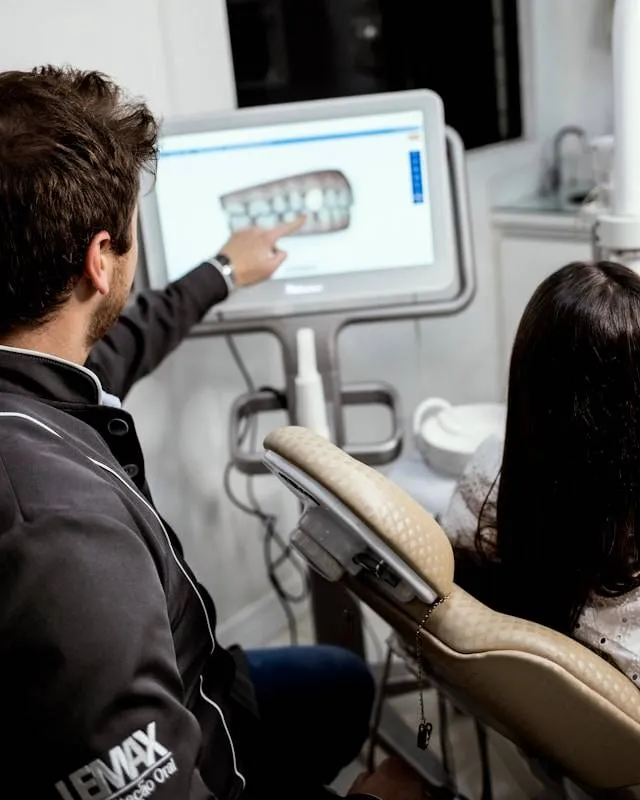1. What is bleeding gums when brushing teeth?
Bleeding gums when brushing teeth is a condition in which the gums bleed when in contact with a toothbrush or dental floss. This is a fairly common phenomenon that many people experience, especially when brushing their teeth in the morning.
Normally, healthy gums are light pink and do not bleed easily when gently brushed. However, when gums are infected or have a health problem, they can become sensitive and bleed more easily, even with light contact with the toothbrush.
Bleeding gums when brushing your teeth is not a normal condition and can be a sign of more serious oral health problems. So if you often experience this condition, do not ignore it but find out the cause and how to fix it.
2. Causes of bleeding gums when brushing teeth
There are several different causes that can lead to bleeding gums when brushing your teeth:
Gingivitis: This is the most common cause of bleeding gums. Gingivitis occurs when bacteria build up on the teeth and along the gum line, causing irritation and inflammation. Inflamed gums become red, swollen, and bleed easily when brushing.
Improper oral hygiene: Brushing too hard, using a hard toothbrush, or not brushing regularly can damage your gums and cause them to bleed easily.
Vitamin deficiencies: Deficiencies in certain important vitamins, especially vitamins C and K, can weaken the gums and make them prone to bleeding.
Use of anticoagulants: Certain medications, such as aspirin or anticoagulants, can increase the risk of bleeding gums.
Hormonal changes: Women during pregnancy, puberty or menopause may experience more sensitive and bleeding gums due to hormonal changes.
Periodontal disease: This is a more severe stage of gingivitis, when bacteria have penetrated deep into the gum tissue and jawbone, causing serious damage.
Systemic diseases: Certain medical conditions such as diabetes, hemophilia, or immunodeficiency can increase the risk of bleeding gums.
Smoking: Smoking weakens the immune system and reduces the ability to fight harmful bacteria in the mouth, leading to gingivitis and bleeding.
3. The harmful effects of bleeding gums when brushing teeth
Bleeding gums when brushing teeth is not only uncomfortable but can also lead to many serious consequences:
Advanced gingivitis: If left untreated, gingivitis can progress to periodontitis, a more serious condition that can lead to tooth loss.
Infection: Bleeding gums allow bacteria to enter the bloodstream, which can cause infections in other parts of the body.
Bad breath: Bacteria buildup in the mouth due to poor hygiene can cause bad breath.
Tooth loss: In severe cases, gingivitis and periodontitis can lead to tooth loss.
Effects on overall health: Research shows a link between periodontal disease and other health problems such as heart disease, diabetes, and some respiratory diseases.
Reduced self-confidence: Bleeding gums and bad breath can affect self-confidence in social interactions.
4. How to recognize bleeding gums when brushing teeth
To recognize bleeding gums when brushing your teeth, you can pay attention to the following signs:
Blood on toothbrush: After brushing your teeth, you see blood on your toothbrush or when you spit out mouthwash.
Red and swollen gums: Healthy gums are light pink, while inflamed gums will be bright red and swollen.
Pain or tenderness to the touch: Inflamed gums are often tender and can be painful to the touch.
Bad breath: Gingivitis can cause bad breath due to bacteria buildup.
Receding gums: In severe cases, you may notice your gums receding, exposing the roots of your teeth.
Loose teeth: If the condition persists, teeth can become loose due to loss of support from the gums and jawbone.
5. Treatments for bleeding gums when brushing teeth
Treatment for bleeding gums when brushing depends on the cause. Here are some common treatments:
Improve oral hygiene: Brush your teeth properly at least twice a day and floss daily to remove plaque.
Use a mouthwash: Mouthwash containing chlorhexidine can help reduce inflammation and kill bacteria.
Dietary changes: Add foods rich in vitamin C to promote gum health.
Scaling: The dentist will remove tartar and plaque that builds up on the teeth and under the gums.
Treatment of periodontitis: In severe cases, periodontitis may need to be treated with a deep cleaning below the gum line or gum surgery.
Medication adjustments: If bleeding gums are a side effect of a medication, your doctor may adjust the dosage or change the medication.
Treating the underlying condition: If bleeding gums are a sign of a systemic disease, treating the underlying condition will help improve the condition of the gums.
6. Prevent bleeding gums when brushing teeth
To prevent bleeding gums when brushing your teeth, you can apply the following measures:
Proper oral hygiene: Brush your teeth at least twice a day, floss daily, and rinse with a fluoride mouthwash.
Use a soft toothbrush: Choose a toothbrush with soft bristles to avoid damaging your gums.
Replace your toothbrush on time: Replace your toothbrush every 3-4 months or sooner if the bristles become worn.
Maintain a balanced diet: Eat plenty of fruits and vegetables rich in vitamin C to promote gum health.
Limit sweets and sticky foods: These foods can easily cause plaque buildup on teeth.
Don't smoke: Smoking increases your risk of gingivitis and periodontal disease.
Stress management: Stress can affect the immune system and increase the risk of gingivitis.
Regular dental check-ups: Visit your dentist at least every 6 months to detect and treat dental problems early.
Control chronic diseases: If you have a condition such as diabetes, keep it under good control to reduce your risk of dental complications.
7. Conclusion
Bleeding gums when brushing your teeth is a warning sign that should not be ignored. Although there are many different causes, most cases are preventable and treatable. Maintaining good oral hygiene habits, combined with a healthy diet and regular visits to the dentist, are the keys to healthy teeth and gums.
If you regularly experience bleeding gums when brushing your teeth, don't hesitate to seek advice from your dentist. They can help determine the specific cause and recommend appropriate treatment.
If you have any questions about bleeding gums when brushing your teeth or other dental problems, do not hesitate to send your questions via the 'ASK A QUESTION' section on our website. Our experts will be ready to answer all your questions.
You can also test your dental knowledge by taking the 'DENTAL QUIZ' game on the website. It's a fun way to learn more about dental health and find out things you might not know.





